This website uses cookies so that we can provide you with the best user experience possible. Cookie information is stored in your browser and performs functions such as recognising you when you return to our website and helping our team to understand which sections of the website you find most interesting and useful.
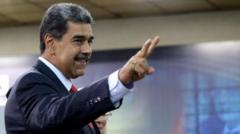
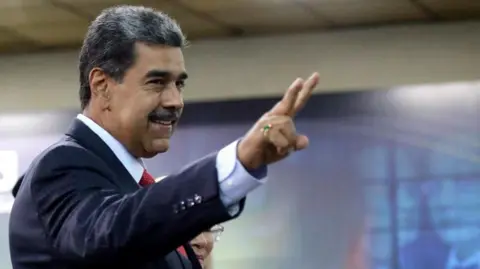 EPA
EPAThere is turmoil in Venezuela following the announcement by a government-controlled electoral authority of a disputed election result that handed a third consecutive term in power to President Nicolás Maduro.
The opposition says the result is fraudulent and that its candidate, Edmundo González, won the election by a wide margin.
The National Electoral Council (CNE), which announced the contested result, has so far failed to provide the voting tallies from individual polling stations that the opposition says demonstrate Mr González is the winner.
With pressure on the CNE growing to release the tallies, Mr Maduro has turned to Venezuela's top court. The move has caused concern. Here we explain why.
What are the voting tallies?
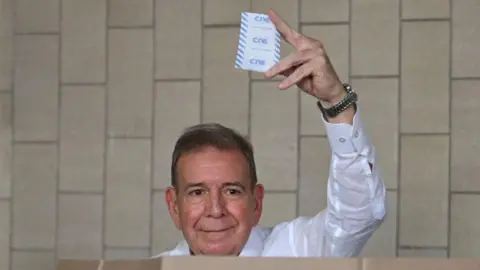 Getty Images
Getty ImagesVenezuela has an electronic voting system. Voters punch in a button assigned to their preferred candidate on a voting machine.
Once the button is pressed, the machine also prints out a paper receipt. Voters place that receipt in a ballot box.
Once polling stations close, the counting begins.
Each voting machine prints out a summary of all the votes cast by voters who used that particular machine.
Additionally, a count of the paper receipts is also conducted at each individual polling station to confirm the machine's printout is correct.
By law, this process is public and anyone can witness it. There are also a number of accredited witnesses representing the different parties.
Once the chair of the count and the accredited witnesses are satisfied that the numbers match, they sign the tally and it is sent electronically to the CNE.
Accredited witnesses are handed a copy and paper printouts of the tallies are also transported to the CNE by the military.
Why are they so important?
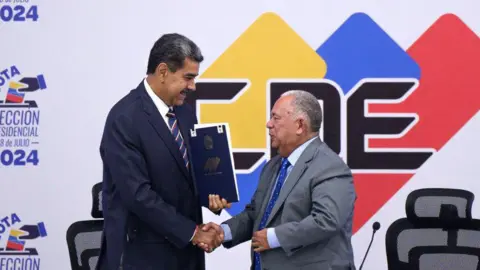 Getty Images
Getty ImagesOut of the five members who make up Venezuela's National Electoral Council (CNE), three are staunch government allies. Its president, Elvis Amoroso, used to work as Mr Maduro's legal counsel.
Fearing the CNE could tamper with the election results, the opposition got thousands of people to act as its official witnesses and - in addition - urged Venezuelan citizens to go to their polling stations to monitor the vote count.
Just after midnight on election night, the CNE announced its first partial results.
It said that with 80% of the votes counted, President Maduro had 5.15m votes compared to 4.44m votes for Mr González.
CNE President Elvis Amoroso said that those figures meant that Mr Maduro had "a convincing and irreversible lead" with 51.2%, and that the opposition trailed with 44.2%.
The opposition quickly contested those results.
Its witnesses had provided it with copies of the voting tallies from polling stations across the country.
Just hours after the election, opposition leader María Corina Machado announced that having seen 40% of the voting tallies, they could confirm that it was their candidate, not Mr Maduro who was in the lead.
In the days following the election, the share of voting tallies the opposition has received has risen to 84%.
The opposition says that those tallies show that Mr González won with 67% of the vote.
Opposition campaigners have shared them with international organisations and independent researchers and uploaded them onto a website which Venezuelans can access by entering their ID number.
They have also urged the CNE to make all the tallies public, arguing that they will show that the Maduro win which the electoral authority announced on election night was fraudulent.
Latin American leaders, including left-wing leaders from Colombia and Brazil, have joined the US, the European Union and independent election observers in increasingly forceful demands for the CNE to finally release these tallies.
What has Maduro said?
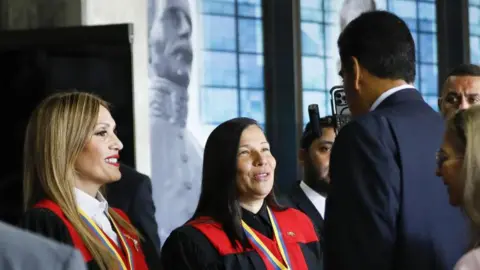 Getty Images
Getty ImagesOn Wednesday, three days after the election, President Maduro said his coalition was "ready to present 100% of the voting tallies that are in our hands".
He made the announcement at the Supreme Tribunal of Justice (TSJ), Venezuela's highest court.
He had earlier blamed the CNE's delay in publishing the tallies on "an unprecedented cyber attack", which he alleged had disrupted the transmission of the tallies from the polling stations.
But instead of making the tallies public, he took the unusual step of filing a "writ of amparo" - a legal move normally used by citizens who think their constitutional rights have been violated.
He asked the top court to audit the voting tallies with a view to confirming the results provided by the CNE which handed him another six-year term in power.
Why has this triggered concern?
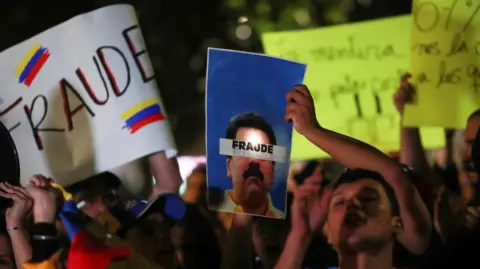 Reuters
ReutersMr Maduro's statement may look like he is bowing to pressure for the tallies to be made public.
But by resorting to the top court, he has found a way to both deflect attention away from the CNE and to delay the publication of the tallies in one swoop.
The ball is now in the court of the Supreme Tribunal (TSJ), whose justices are overwhelmingly government loyalists.
The proceedings there are likely to be conducted behind closed doors, in which case even if Mr Maduro provides the tallies, only the justices will be able to access them.
In the short term, this deflects the pressure from the CNE and also allows Mr Maduro to argue that he has complied with international requests to hand over the tallies.
And in the medium term, should the court rule in his favour, he will hope this endorsement bolsters his claim that he is the winner of the election.
However, this move has already been dismissed by independent bodies, including the Carter Center, which was invited by the Maduro government to observe the election.
Jennie K. Lincoln, who led the Carter Center delegation, told AP news agency that the TSJ is "another government institution, appointed by the government, to verify the government numbers for the election results, which are in question".
"This is not an independent assessment."
What else has the Maduro government done to stay in power?
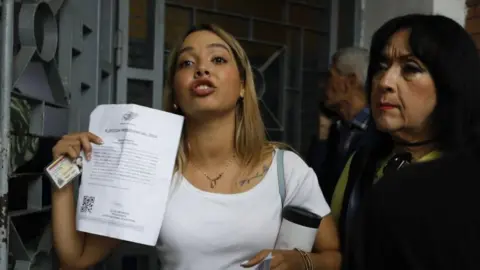 Getty
GettyThis is not the first time that a Maduro electoral victory has been denounced as fraudulent.
The 2018 election was widely dismissed as neither free nor fair after opposition candidates were jailed, barred from running or forced into exile.
And it is not just the CNE's result of the 2024 election which has been questioned.
The Carter Center, which has monitored more than 100 elections around the globe, cited a long list of problems with the electoral process, including:
- Venezuelans abroad facing excessive legal requirement to register to vote
- Harassment and intimidation of people who provided services and goods to the main opposition campaign
- Potential pressure on voters exerted by ruling party checkpoints near polling stations
It concluded that the 2024 presidential election "cannot be considered democratic".



 Africana55 Radio
Africana55 Radio 

